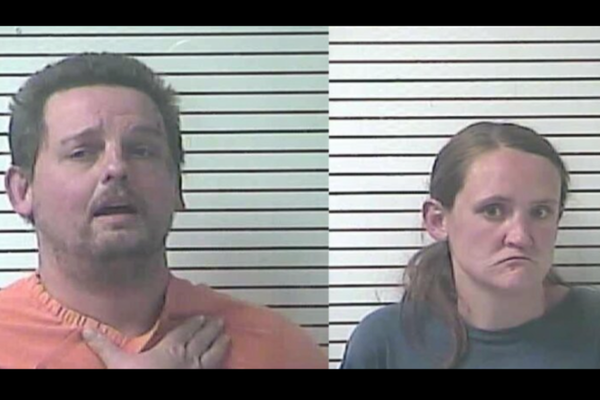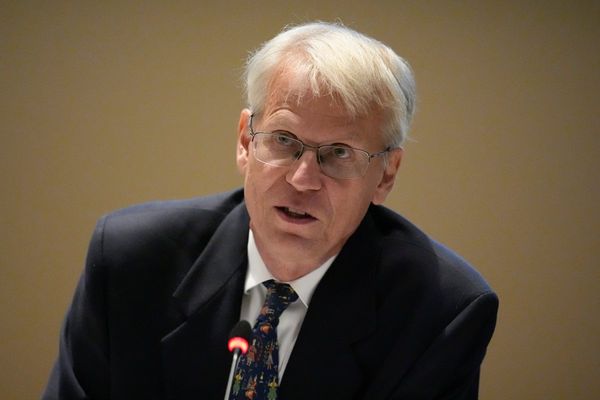
Intermittent rain was no deterrent for the steady stream of voters who flocked to a Sydney polling booth on Monday morning, many of them keen to avoid the chaos of casting their ballot on election day.
Mick Ragusa, a 25-year-old electrician who cast his vote early, says he will be holidaying on election day – but “if I can do it before, I always do”.
“[I] hate going there; it’s manic, it’s crazy,” he says, preferring to just “get it over and done with”.
Ragusa is among a growing cohort of early voters. When early voting opened last Tuesday, about 542,000 people lined up and cast their vote – compared with 314,000 on the first day of early voting in the 2022 election.
By Monday afternoon, 2.95 million Australians had already cast their ballot out of the 18 million enrolled to vote, according to the Australian Electoral Commission. A spokesperson says this is sitting “slightly above the 2019 and 2022 levels, which is broadly in line with our expectations”.
People leaving the ballot booth in the Sydney suburb of Randwick voted early for a number of reasons, but mostly because of work, holidays or simply because it was more convenient.
Richard, who did not wish to give his last name, knows he will be busy on Saturday and isn’t sure if he will make it to a polling centre.
“I certainly won’t have time to queue,” he says, having voted early in the most recent state and council elections as well.
Richard says that generally his “mind is made up before I get here”.
“There’s often noise and confusion and a lot of people, [so I want to] avoid that.”
Rodney Smith, a professor of Australian politics at the University of Sydney, says the growth in pre-polling this federal election – and in 2022 – is part of a broader change in social patterns among Australians.
In the past, most Australians didn’t work on Saturdays or finished at midday, but these days there are much more flexible working hours. There are also more pre-poll centres compared with the 1990s when early voting was introduced.
“The older you are, the more likely you are to vote early,” Smith says. “I know [there’s a] large number of young people in the electorate, but there’s an ageing population.
“I think working patterns [are] unlikely to go back to [that] nine to five, Monday to Friday or Saturday morning pattern. There are increased responsibilities for people around weekends, and people want to use the weekend for some fun activity other than voting.”
Nursing students Sujit Krishna, Tanuj Malhotra and James Downey walked down the road to the Randwick polling both during their lunch break on Monday. They are all working on election day.
Krishna says it is “a little less chaotic” and Malhotra finds the process “pretty seamless”. Downey says even though they don’t really have a choice this time, he prefers to vote early.
“It’s just faster, more convenient, and it has no actual bearing on the democratic process,” he says.
For South Australian Katherine Moseby – who is in Sydney for work and won’t be home in time for Saturday – early voting is something she is familiar with.
She and her family have to travel from their regional town on the Eyre Peninsula to Kimba – a 100km round trip – to cast their ballots.
“It’s usually on a Saturday when there’s no shops open so it’s hard to do anything else while you’re in there,” she explains. “Being able to vote early means I don’t have to make a special trip into town to vote. I love early voting, I think it’s great.”
She particularly appreciates the convenience, and missing “the crowds and the rush”.
An AEC spokesperson says early votes will “easily” hit the 3m mark by polling day. Thursday and Saturday were both particularly popular for pre-pollers, the spokesperson says.
“Thursday had more voters overall but our opening hours were longer – we technically had a higher voter density on Saturday. On both days, more than 600,000 voters cast votes.”
As for why there has been such a large turnout, the spokesperson says it is “difficult to make a definitive call with half of the early voting period still to come”, but they point to the “potential effects” of the double public holiday and school holidays last week.
The growth rate in early voters was much lower in 2022 versus 2019 than it was for 2019 versus 2016, “so it’s possible that we are hitting the natural cap of voters who are willing to cast an early vote”, the spokesperson adds.
Smith agrees there is a “ceiling to early voting” and that Saturday would be the “busiest day of voting for quite some time yet”.
But the two major parties are beginning to take notice, he says, noting that the Labor and Coalition campaigns were launched before pre-polling opened this year – instead of later in the campaign.
“I think there is a recognition by the political parties that if they don’t do their campaign launch early and get some of their major policies out early, then they’re going to miss out on the opportunities to persuade voters who want to vote early.”
Smith says pre-polling also appears to be more popular in safe seats, whereas voters in marginal voters are likely to wait until closer to the election day.
“If you know kind of what the outcome is in your electorate, you might as well just do your duty – and you’re either contributing to a winning side, or you’re on the losing side.”







